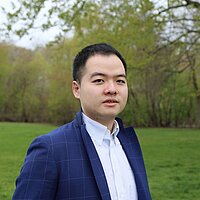Short bio
Zhouyang Ma joined the institute in 2023 as a postdoctoral research fellow under the ERC-funded research project “The Dawn of Tibetan Buddhist Scholasticism (11th–13th c.)" (TibSchol). Born in China with a deep fascination for Inner Asian cultures and religions, Zhouyang Ma embarked on his journey into Tibetan Studies as an undergraduate in 2011. His academic journey led him to earn an MA in East Asian Studies from Columbia University in 2016, followed by a PhD in Inner Asian and Altaic Studies from Harvard University in 2023.
Zhouyang Ma’s current research revolves around the rich tapestry of Buddhist culture within the Tangut Xia State, also known as Xixia or Western Xia (1038–1227). This historical period witnessed a convergence of Tibetan and Chinese Buddhist traditions in the Tangut area, and Zhouyang Ma’s doctoral dissertation, titled “An Inner Asian Buddhist Revolution: The Rise of Tibetan Buddhism in the Tangut Xia State,” delves into how the Tanguts became the earliest adopters of Tibetan Buddhism outside of the Tibetan heartland. His research interests encompass the compelling cultural exchanges between Tibetan and Tangut Buddhists, the intricate interplay between religion and politics, and the practices of Buddhist scholasticism within the Tangut State.
Beyond his research pursuits, Zhouyang Ma is an experienced educator, proficient in teaching languages and cultures, and actively engaged in the study of relevant pedagogy. His educational credentials include the Bok Certificate in Teaching Language and Culture and the Certificate of Distinction in Teaching from Harvard University. Over the years, he has imparted knowledge through general educational courses focusing on Chinese classics and Buddhist philosophy, along with extensive experience teaching Classical Tibetan. Currently, Zhouyang Ma is working on an introductory textbook for the Tangut language.
Selected publications
“Unveiling Gsang phu Madhyamaka Thought in Xixia: The Tangut Version of the Analysis of the Essence of Madhyamaka.” Acta Orientalia Academiae Scientiarum Hungaricae 76, no. 2 (2023): 239–271. https://doi.org/10.1556/062.2023.00292.
“Subhāṣākīrti’s Sarvabhāṣāpravartana and Its Relevance to the Smra sgo,” in Histories of Tibet: Essays in Honor of Leonard W. J. van der Kuijp., edited by Kurtis R. Schaeffer, Jue Liang, and William A. McGrath, 387–402. New York: Wisdom Publications, 2023.
“Introduction to Speculative Thinking: A Hitherto Unknown Work of Maja Jangchup Tsöndrü (d. 1185, Tib. rMa bya Byang chub brtson ’grus) in Tangut Translation.” BuddhistRoad Papers 1.5. DOI: 10.46586/rub.br.244.221. https://omp.ub.rub.de/index.php/BuddhistRoad/catalog/book/244.
“The Nyāyabindu in Tangut Translation.” Journal of Indian Philosophy 49, no. 5 (December 2021): 779–825. https://doi.org/10.1007/s10781-021-09479-w.
“Xixia yi Zhengli chu yi zhi an chu tan” 西夏译《正理除意之暗》初探 [A Preliminary Analysis of the Tangut Translation of Tshad ma yid kyi mun sel]. Zhongguo zangxue/China Tibetology, no. 3 (August 2021): 138–145.
